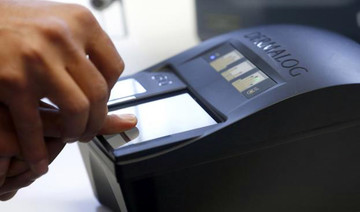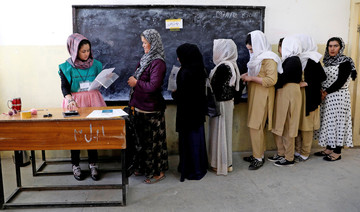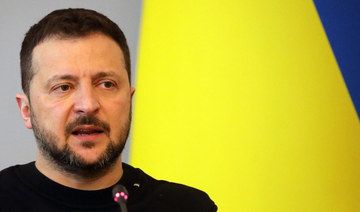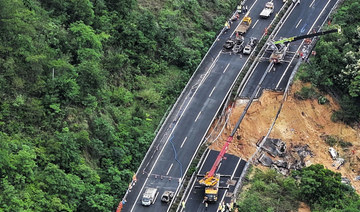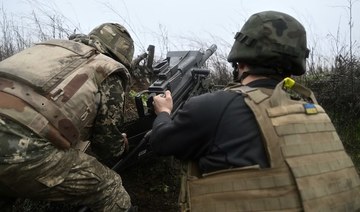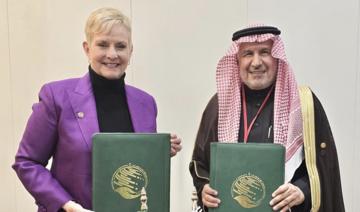KABUL: More than 800 faces, 15 pages, one vote. Kabul voters will wrestle with newspaper-sized ballot papers on October 20, racing to find their candidate in a city under constant threat from militant attacks.
The huge number of parliamentary hopefuls vying to represent Kabul province, where around one-fifth of Afghanistan’s population lives, is the highest of anywhere in the country.
The candidates account for almost a third of the more than 2,500 people contesting long-delayed elections for Afghanistan’s lower house, or Wolesi Jirga.
Each voter can only choose one candidate, but finding them on Kabul’s giant ballot paper, which is roughly the size of a tabloid newspaper, could be time consuming.
It is hardly ideal when the risk of the Taliban or the Daesh group attacking polling centers is high.
Militants have vowed to target the ballot and those organizing it, calling the polls a “malicious American conspiracy.”
To make the process easier and faster for voters, candidates are advertising their numerical position and ballot page number — along with their often digitally enhanced photos — on campaign posters on lamp posts, billboards and blast walls around the province.
The key numbers appear alongside symbols such as palm trees, lions or spectacles, used by each candidate to enable illiterate voters to identify them.
With lofty promises of pushing for “change,” “justice” and even making “streets from gold, schools from diamonds and universities from emeralds,” candidates are locked in a fierce battle for the 33 seats allocated to Kabul.
More than 1.6 million votes are up for grabs — more than any other province — according to Independent Election Commission (IEC) voter registration data.
But many suspects that a significant number of those may be fake, created by fraudsters using counterfeit identification documents that could be used to stuff ballot boxes.
Biometric verification machines designed to prevent people voting more than once are scheduled to be used — but there are fears these may not arrive at polling centers in time, or fail to work.
An eleventh-hour decision to use the devices for the first time in an Afghan election has left beleaguered organizers scrambling to import and distribute them to more than 5,000 polling centers ahead of the vote.
While Afghan law does not require the use of biometric verification, votes cast without it will not be counted, IEC spokesman Sayed Hafizullah Hashimi said.
Despite the unusual size of Kabul’s ballot paper — and the potential for hundreds of thousands of votes to be cast — Hashimi said regular boxes would be used to collect ballots on election day.
“We have around six million people (in Kabul) — it is very populated,” Hashimi said.
“If the boxes fill up, we have reserve boxes.”
Kabul voters wrestle with newspaper-sized ballot paper
Kabul voters wrestle with newspaper-sized ballot paper
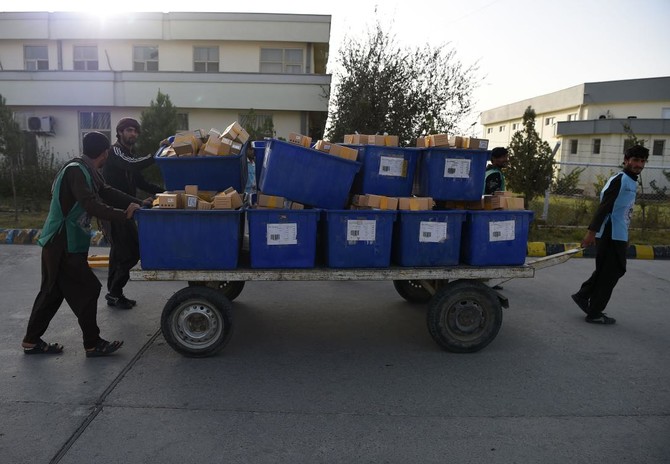
- Each voter can only choose one candidate, but finding them on Kabul’s giant ballot paper could be time consuming
- More than 1.6 million votes are up for grabs, more than any other province
Afghanistan’s only female diplomat resigns in India after gold smuggling allegations
According to Indian media reports, she has not been arrested because of her diplomatic immunity
ISLAMABAD: Afghanistan’s diplomat in India, who was appointed before the Taliban seized power in 2021 and said she was the only woman in the country’s diplomatic service, has resigned after reports emerged of her being detained for allegedly smuggling gold.
Zakia Wardak, the Afghan consul-general for Mumbai, announced her resignation on her official account on the social media platform X on Saturday after Indian media reported last week that she was briefly detained at the city’s airport on allegations of smuggling 25 bricks of gold, each weighing 1 kilogram (2.2 pounds), from Dubai.
According to Indian media reports, she has not been arrested because of her diplomatic immunity.
In a statement, Wardak made no mention of her reported detention or gold smuggling allegations but said, “I am deeply sorry that as the only woman present in Afghanistan’s diplomatic apparatus, instead of receiving constructive support to maintain this position, I faced waves of organized attacks aimed at destroying me.”
“Over the past year, I have encountered numerous personal attacks and defamation not only directed toward myself but also toward her close family and extended relatives,” she added.
Wardak said the attacks have “severely impacted my ability to effectively operate in my role and have demonstrated the challenges faced by women in Afghan society.”
The Taliban Foreign Ministry did not immediately return calls for comment on Wardak’s resignation. It wasn’t immediately possible to confirm whether she was the country’s only female diplomat.
She was appointed consul-general of Afghanistan in Mumbai during the former government and was the first Afghan female diplomat to collaborate with the Taliban.
The Taliban — who took over Afghanistan in 2021 during the final weeks of US and NATO withdrawal from the country — have barred women from most areas of public life and stopped girls from going to school beyond the sixth grade as part of harsh measures they imposed despite initial promises of a more moderate rule.
They are also restricting women’s access to work, travel and health care if they are unmarried or don’t have a male guardian, and arresting those who don’t comply with the Taliban’s interpretation of hijab, or Islamic headscarf.
Russia puts Ukraine's Zelensky on wanted list, TASS reports
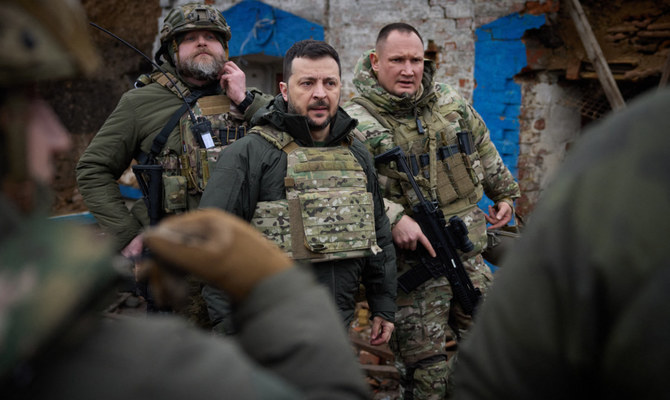
- Russia has issued arrest warrants for a number of Ukrainian and other European politicians
MOSCOW: Russia has opened a criminal case against Ukrainian President Volodymyr Zelensky and put him on a wanted list, the state news agency TASS reported on Saturday, citing the Interior Ministry's database.
The entry it cited gave no further details.
Russia has issued arrest warrants for a number of Ukrainian and other European politicians since the start of the conflict with Ukraine in February 2022.
Russian police in February put Estonian Prime Minister Kaja Kallas, Lithuania's culture minister and members of the previous Latvian parliament on a wanted list for destroying Soviet-era monuments.
Russia also issued an arrest warrant for the International Criminal Court (ICC) prosecutor who last year prepared a warrant for President Vladimir Putin on war crimes charges.
A Chinese driver is praised for helping reduce casualties in a highway collapse that killed 48
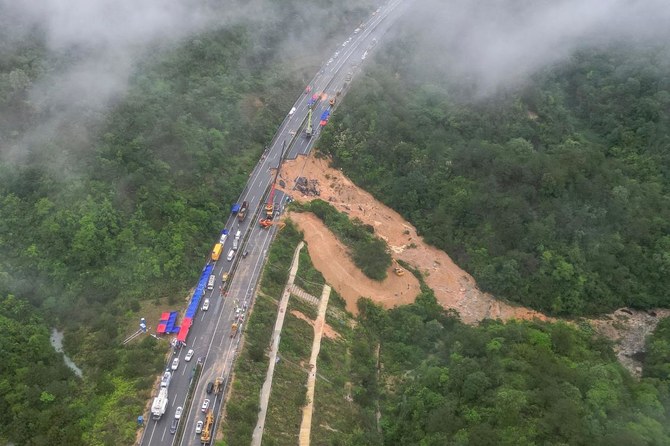
- Reacting swiftly, Wang, a former soldier, positioned his truck to block the highway, effectively stopping dozens of vehicles from advancing into danger
- His wife got out of the truck to alert other drivers about the situation
BEIJING: A Chinese truck driver was praised in local media Saturday for parking his vehicle across a highway and preventing more cars from tumbling down a slope after a section of the road in the country’s mountainous south collapsed and killed at least 48 people.
Wang Xiangnan was driving Wednesday along the highway in Guangdong province, a vital economic hub in southern China. At around 2 a.m., Wang saw several vehicles moving in the opposite direction of the four-lane highway and a fellow driver soon informed him about the collapse, local media reported.
Reacting swiftly, Wang, a former soldier, positioned his truck to block the highway, effectively stopping dozens of vehicles from advancing into danger, Jiupai News quoted Wang as saying. Meanwhile, his wife got out of the truck to alert other drivers about the situation, it said.
“I didn’t think too much. I just wanted to stop the vehicles,” Wang told the Chinese news outlet.
Wang’s courageous actions not only garnered praise from Chinese social media users but also recognition from the China Worker Development Foundation.
The foundation announced Friday that in partnership with a car company it had awarded Wang 10,000 yuan ($1,414). A charity project linked to tech giant Alibaba Group Holding also gave an equal amount to Wang, newspaper Dahe Daily reported. Wang told the newspaper he would donate the money to the families of the collapse victims.
Local media also reported that another man had knelt down to prevent cars from proceeding on the highway.
The accident came after a month of heavy rains in Guangdong. Some of the 23 vehicles that plunged into the deep ravine burst in flames, sending up thick clouds of smoke.
About 30 people were hospitalized. On Saturday, one was discharged from the hospital, state broadcaster CCTV reported. The others were improving, but one remains in serious condition.
On Saturday, the Meizhou city government in Guangdong said in a statement that authorities would conduct citywide checks on expressways, railways and roads in mountainous areas. A team led by the provincial governor is investigating the cause of the collapse, Southcn.com reported.
The Chinese government had sent a vice premier to oversee recovery efforts and urged better safety measures following calls by President Xi Jinping and the Communist Party’s No. 2 official, Premier Li Qiang, to swiftly handle the tragedy.
The dispatch of Zhang Guoqing, who is also a member of one of the ruling Communist Party’s leading bodies, illustrates the concern over a possible public backlash over the disaster, the latest in a series of deadly infrastructure failures.
Russia says it shot down four US-made long range missiles over Crimea

- The ATACMS missiles, with a range up to 300km were used for the first time in the early hours of April 17
MOSCOW: The Russian defense ministry said on Saturday its air defense forces shot down four US-produced long-range missiles over the Crimea peninsular, weapons known as Army Tactical Missile Systems (ATACMS) that Washington has shipped to Ukraine in recent weeks.
The ministry said later that Russian aircraft and air defense systems had downed a total of 15 ATACMS in the past week.
On Tuesday, Russian officials said Ukraine had attacked Crimea with ATACMS in an attempt to pierce Russian air defenses of the annexed peninsula but that six had been shot down.
A US official said in Washington last month that the United States secretly shipped long-range missiles to Ukraine in recent weeks.
The ATACMS missiles, with a range up to 300km were used for the first time in the early hours of April 17, launched against a Russian airfield in Crimea that was about 165 km (103 miles) from the Ukrainian front lines, the official said.
The Pentagon initially opposed the long-range missile deployment, concerned that taking the missiles from the American stockpile would hurt US military readiness.
There were also concerns that Ukraine would use them to attack targets deep inside Russia, a step which could lead to an escalation of the war toward a direct confrontation between Russia and the United States.
Separately on Saturday, the Russian defense ministry said that in the last week its forces had destroyed a military train carrying equipment and arms produced in the West and supplied to Ukraine by NATO.
The scale of the damage, exact date and location were not disclosed.
Reuters is not immediately able to corroborate battlefield accounts from either side.
On Thursday, British Foreign Secretary David Cameron promised 3 billion pounds ($3.7 billion) of annual military aid for Ukraine for “as long as it takes,” adding that London had no objection to its weapons being used inside Russia, drawing a strong rebuke from Moscow.
South Sudan removes newly imposed taxes that had triggered suspension of UN food airdrops
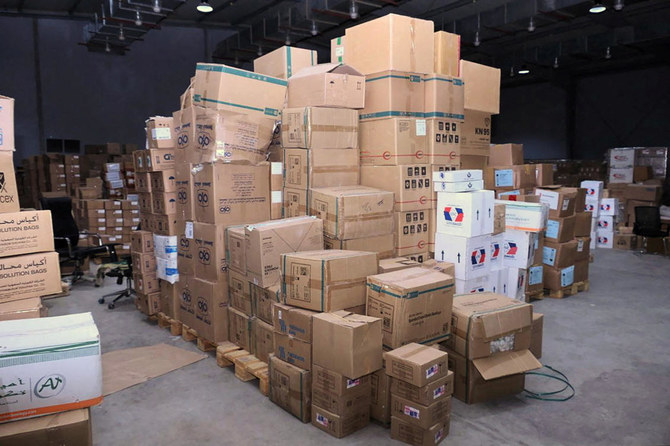
- The UN earlier this week urged South Sudanese authorities to remove the new taxes, introduced in February
- There was no immediate comment from the UN on when the airdrops could resume
JUNA, South Sudan: Following an appeal from the United Nations, South Sudan removed recently imposed taxes and fees that had triggered suspension of UN food airdrops. Thousands of people in the country depend on aid from the outside.
The UN earlier this week urged South Sudanese authorities to remove the new taxes, introduced in February. The measures applied to charges for electronic cargo tracking, security escort fees and fuel.
In its announcement on Friday, the government said it was keeping charges on services rendered by firms contracted by the UN peacekeeping mission in South Sudan.
“These companies are profiting ... (and) are subjected to applicable tax,” Finance Minister Awow Daniel Chuang said.
There was no immediate comment from the UN on when the airdrops could resume.
Earlier, the UN Humanitarian Affairs Agency said the pausing of airdrops had deprived 60,000 people who live in areas inaccessible by road of desperately needed food in March, and that their number is expected to rise to 135,000 by the end of May.
The UN said the new measures would have increased the mission’s monthly operational costs to $339,000. The UN food air drops feed over 16,300 people every month.
At the United Nations in New York, UN spokesman Stéphane Dujarric said the taxes and charges would also impact the nearly 20,000-strong UN peacekeeping mission in South Sudan, “which is reviewing all of its activities, including patrols, the construction of police stations, schools and health care centers, as well as educational support.”
An estimated 9 million people out of 12.5 million people in South Sudan need protection and humanitarian assistance, according to the UN The country has also seen an increase in the number of people fleeing the war in neighboring Sudan between the rival military and paramilitary forces, further complicating humanitarian assistance to those affected by the internal conflict.



